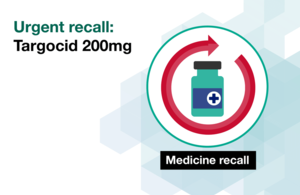Patients urged to check packs of Targocid 200mg after two batches found to be contaminated
Patients using antibiotic Targocid 200mg powder at home must check if the batch number of their medicine is 0J25D1 or 0J25D2. Anyone who has one of these two batches should stop their treatment and seek immediate medical advice

Two batches of Targocid 200mg powder for solution for injection/infusion or oral solution are being recalled by Sanofi UK after they were found to contain high levels of bacterial endotoxins, a toxic compound found in bacterial cell walls that can cause inflammation-related symptoms, high fever and, in very serious cases, septic shock.
The issue was detected when four patients experienced high fevers approximately three hours after being given a dose from one of the affected batches, with the batch numbers 0J25D1 and 0J25D2.
The Medicines and Healthcare products Regulatory Agency (MHRA) is urging patients who have been prescribed Targocid 200mg powder to use at home (via intravenous injection/infusion or by preparing the solution for oral administration) to check the batch number and expiry date (30/04/2023) on the labels of their medicine to see if their medicine is affected. If so, they should stop using the medicine and seek immediate medical advice from a healthcare professional.
Healthcare professionals have been asked to contact patients who are using this medicine and urgently arrange for a new prescription. Patients using Targocid 200mg who have experienced any of the symptoms listed in recall notification should immediately seek medical assistance
Targocid is an antibiotic used to treat a wide range of infections. It contains a medicine called ‘teicoplanin’ and works by killing the bacteria that cause infections in the body. For most patients this product is administered by healthcare professionals directly in hospitals, but for some patients it is prescribed to use at home. Patients using generic brands of this product and unaffected batches of Targocid do not need to be concerned.
Dr Alison Cave, MHRA Chief Safety Officer, said:
Patient safety is always our priority. It is vitally important that you check the labels of your Targocid 200mg powder and if the batch number is 0J25D1 or 0J25D2, you should stop using the medicine and seek immediate medical advice from a healthcare professional. If you are unsure which batch you have been given to use at home, please seek medical advice.
Your healthcare professional will arrange a new prescription for you and answer any questions you may have.
If you are using Targocid 200mg powder and experience any new symptoms, seek medical assistance or visit the nearest accident and emergency centre. Please report any adverse reactions via the Yellow Card scheme website.
We have taken prompt action to ensure affected batches will no longer be given to patients. Other products containing teicoplanin have not been affected by this recall.
General symptoms that patients should be looking for include fever or low body temperature; chills and shivering; cold, clammy and pale or mottled skin; a fast heartbeat; fast breathing; severe breathlessness; severe muscle pain; feeling dizzy or faint; a change in mental state – such as confusion or disorientation; loss of consciousness; slurred speech; nausea and vomiting; diarrhoea and feeling increasingly unwell.
For details on the batch numbers affected, please see the recall notification.
Notes to Editors
- National Patient Safety Alert: Class 1 Medicines Recall Notification: Recall of Targocid 200mg powder for solution for injection/infusion or oral solution – This is a patient-level recall (Class 1) of 2 batches of Targocid 200mg powder for solution for injection/infusion or oral solution at patient, pharmacy and wholesaler level: approximately 50,000 distributed packs and 8,200 packs that remain on hold and will not be released.
- Detailed instructions for healthcare professionals can be found in the recall notice.
- The Medicines and Healthcare products Regulatory Agency (MHRA) regulates medicines, medical devices and blood components for transfusion in the UK. MHRA is an executive agency, sponsored by the Department of Health and Social Care.